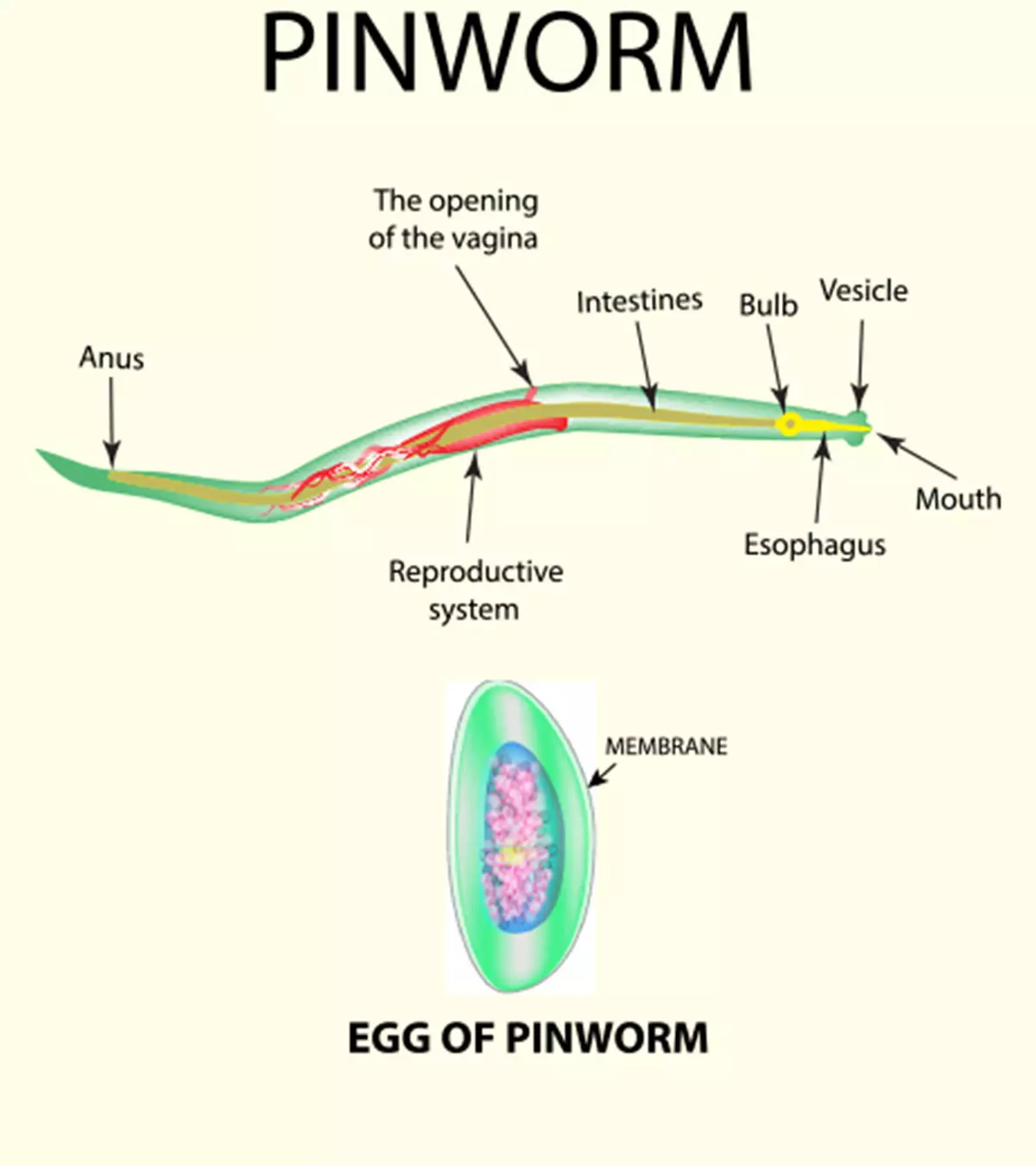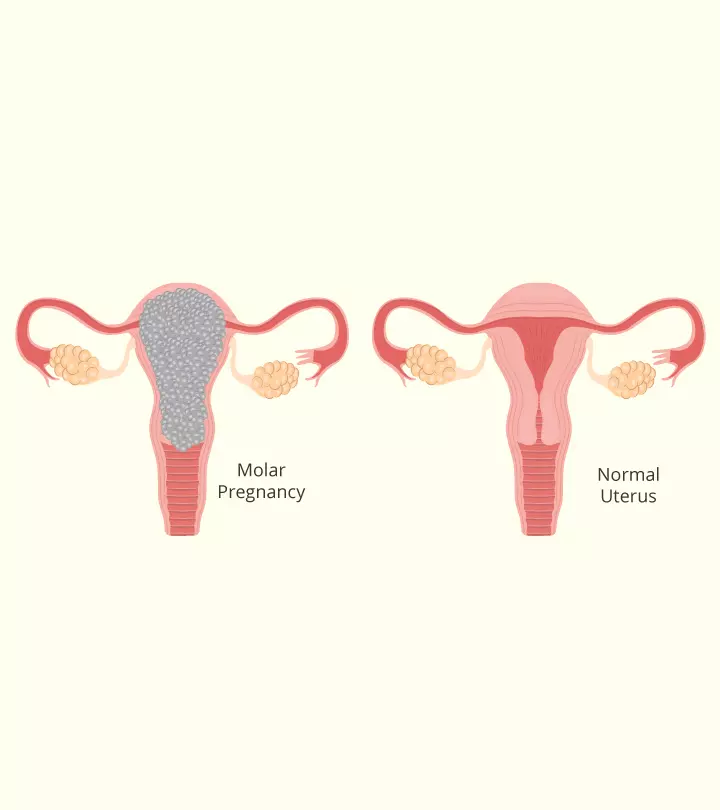
Image: iStock
The bowel movements of an infant are an important measure of their overall health. The regularity with which a baby poops could indicate the quality of their nutrition and overall health. Therefore it is only normal for parents to be concerned when the baby is not pooping but passing gas.

It may help to know that inconsistent bowel motions in infants could be caused by various factors, ranging from benign (harmless) disorders to underlying illnesses. Read on to learn more about normal pooping patterns in babies, what causes infrequent pooping, and when to be concerned about it.
Key Pointers
- If your baby is not pooping but constantly passing gas, the reasons could include constipation, food changes, and allergies.
- The frequency of passing stool varies in babies depending on the food type and eating frequencies.
- However, if your baby does not poop for more than three days, visit a doctor immediately.
How Often Should A Baby Poop?

The frequency of pooping varies among babies. Medical doctor Dr. Kavita Krishnan explains, “In healthy, exclusively breastfed infants, stool frequency can vary widely—some babies may poop several times a day, while others may go several days without a bowel movement. After the first four to six weeks, some breastfed babies may go up to seven to ten days without passing stool. If the baby is comfortable, happy, and gaining weight appropriately (about 150g per week), it is usually not a cause for concern.” The following are the key attributes of normal bowel movements among most infants (1) (2).
- The baby will poop their first stool called meconiumiThe baby's first stool after birth that is sticky, thick, and dark green , which is olive green in color and odorless. About 99% of newborns pass the stool within 24 hours (3). Most babies eventually pass meconium within 48 hours.
A newborn not being able to pass meconium within 48 hours of birth may warrant the need for healthcare professionals to rule out Hirschsprung’s disease. According to the American Family Physician, this condition occurs in about 1 in 5,000 children and is generally identified in infancy (4).
 Quick fact
Quick fact- Once the meconium passes, the baby will begin pooping actual stool.
- Babies usually poop one to two times a day during their first week.
- The pooping frequency may increase to five to ten times a day from the second week and stay that way for the first month. Some babies may poop after each feeding session.
- After the first month, the frequency of pooping begins to drop.
- By the second month, the frequency of pooping may significantly reduce with some babies pooping once in two days (5).
The frequency of pooping usually becomes less predictable and greatly varied as the baby grows older and their digestive system matures. Breastfed babies tend to poop more often when compared to formula-fed babies.
Once your baby is older than six months and consumes solids, there could be significant variation in their pooping frequency, depending on the type of solid food they eat and the frequency of eating.
Is It Normal For A Breastfed Baby To Not Poop For Days?
Yes, it is okay for a breastfed or even formula-fed baby to not poop for a couple of days. According to the American Academy of Pediatrics, it is normal for some babies to be slow poopers and have one poop every few days (4).
Experts state that more than the frequency of pooping, parents must focus on the type of stool. If the baby’s stool is hard, contains blood, or is white in color, it could indicate an underlying problem.
What Can Cause Your Baby To Not Poop?

If your baby did not poop in a day, wait for a couple of days. Be watchful of the baby’s poop color and consistency. You may also check if the baby is getting enough feeds since inadequate feeding could cause the baby to not poop much.
A baby may continue to not poop for many days due to the following reasons.
1. Constipation
Constipation is common in babies and is usually indicated by the lack of pooping for several days (4) (6). According to a study in The Journal of Pediatrics, among 4,157 children under 2 years old, 185 had constipation (7). Apart from not pooping, the baby may have constipation if they:
- Strain for ten minutes at a time to poop but with no excretion.
- Excrete dry, hard, and pellet-shapediSmall, round, hard, or tube-shaped lumps of something stool, which is visibly devoid of fluid.
- Often act fussy, especially while straining.
- Act fussy and cry while rubbing their tummies.
In severe cases, the baby may have a bloated, distended abdomen, which is hard to touch.
There are various reasons for the newborn not pooping but passing gas, ranging from a change in formula milk to gastrointestinal ailments. Newborns may develop meconium constipation due to underlying conditions, such as meconium plug syndrome or gastrointestinal anomalies (3). You may read more about baby constipation and its causes here.
 Did you know?
Did you know?2. Changes in diet
The following notable changes in the baby’s diet could affect the frequency of pooping (8).
- Formula-fed babies may require changes in their formula as they grow older. A baby may poop less frequently during the transition.
- Babies who switch from breast milk to formula may develop constipation for a few days.
- Introduction of solid food may temporarily cause constipation.
- Decreased milk output from mother. If the baby is not passing stools and the frequency of urination of the baby is also less than four times a day, it may be because of decreased amount of feed.
3. Food allergies and intolerances
Based on data provided by the Centers for Disease Control and Prevention (CDC), children aged zero to five have an estimated food allergy prevalence rate of 4.4%. It’s important to note that some babies may not frequently poop due to these food allergies and intolerances (9) (10) (11). It is likely to be more common among older babies who consume a variety of solid food items. Newborns could be allergic to substances in the formula milk.
Babies with lactose intolerance may develop gastrointestinal problems, including constipation, even when fed breast milk. In such cases, the baby is also likely to display poor growth and lethargy due to inadequate nourishment.
When To See A Doctor?

Consult a doctor if the baby displays the following conditions (8).
- No meconium excretion for over three days
- Decreased oral acceptance or baby is refusing feeds
- Baby is less active/lethargic
- Lack of pooping for over three days
- Consistent excretion of hard, pellet-like or lumpy stool
- Stool contains streaks of blood or is white in color
- Abdomen appears stiff and hard to touch
- Increased size of abdomen
- Baby cries when the abdomen is touched
- Constipation is accompanied by vomiting or fever
If your baby is younger than three months, see a doctor for any concerns related to the frequency of pooping, even if the baby is otherwise healthy. Do not try any home remedy or treatment without first consulting a pediatrician.
Treatment For Infrequent Pooping In Babies

The treatment will depend on the underlying cause. The doctor may order tests, such as blood tests and X-rays, and ask about the baby’s medical history. Treatment would be recommended based on the diagnosis.
The treatment may include the following.
- Oral medications may help relieve constipation in some babies.
- Severe cases of constipation due to pathologies may require fecal disimpactioniEvacuation of the hardened stool from the rectum and colon through suppositories or enemasiA liquid that is injected into the rectum to expel the stool from the lower rectum . Subsequent treatment of the cause might be required.
- Changes in diet may help babies who consume solid food. The pediatrician may refer you to a pediatric dietician who would chart a diet for healthy bowel movements and adequate nutrition.
- Babies with allergies and intolerances could benefit from changes in formula and other dietary changes to avoid the allergen.
Most cases of constipation and erratic bowel movements in babies can be addressed with appropriate home care.
Home Remedies For Infrequent Pooping

Consult a doctor before trying any home remedies. You may try the following home remedies to alleviate constipation and improve the frequency of pooping in babies (12).
- Check if the baby is feeding adequately. If your baby is exclusively breastfed, increase the frequency of feeds. You can add two to three extra feeding sessions for a few days and check for the baby’s bowel movements.
- If the baby is formula-fed, speak to a doctor and increase the frequency of feeds if required. The doctor may even suggest switching to another formula.
- Babies older than one month can be given an ounce of fruit juice a day. Fruit juices contain sugars that are not digested adequately by the baby’s digestive system. The sugars draw water into the intestine and help ease constipation. The ounce of juice should be equal to the baby’s age in months. Thus, a two-month-old gets two ounces a day and so on. If juice does not improve constipation in three days, consult a doctor.
- Babies older than six months can be served homemade prunes puree for constipation. You may also serve prune juice. Prunes work the same way as other fruit juices in easing constipation.
 Quick tip
Quick tip- Babies who eat solids can be served extra water a day. Inadequate water intake may also lead to constipation. You can offer water every two to three hours to the baby. Do not force the baby to drink water if they do not wish to drink it.
According to Nationwide Children’s Hospital, rice cereal can sometimes cause constipation. Offering oatmeal, whole wheat, or barley cereal may help alleviate this issue (12).
- Babies who eat solids can be served pureed high-fiber fruits and vegetables. A few examples of high-fiber foods are beans, spinach, apricots, pears, plums, and peas. You can also switch to fiber-rich baby cereal. Serve them twice to thrice a day for optimum results.
- You may massage the baby’s belly when they are empty stomach. Use your fingers to gently massage around the baby’s belly button in circular motions. Apply very gentle pressure. You may massage for 30 seconds at a time once or twice a day, especially after a warm bath. Massage may help stimulate intestinal muscles and improve bowel movement.
- Let your baby get adequate exercise, including assisted exercise. Lay the baby on their back and gently move their legs in a bicycling or pedaling motion for 30 seconds to a minute. Your baby can also exercise by crawling and through tummy time. These exercises improve gastrointestinal muscle movement and may also aid in digestion.
Never give the baby over-the-counter laxative or stool softeners, mineral oil, enema, suppositoriesiA drug injected into the vaginal, urethral, or rectal routes to be digested and absorbed by the body , and alternative medicines for constipation without consulting a doctor.
Frequently Asked Questions
1. Can a baby be constipated and still fart?
Constipation and flatulence (passing gasses) may be seen in babies who are not exclusively breastfed. In most cases, constipation may resolve within a short time without interventions. Although it is not unusual for exclusively breastfed babies to poop less and pass gasses, they won’t be constipated.
2. How long can babies go without pooping?
It may depend on the age and diet of the baby. Babies older than eight weeks may not poop for four to five days. Exclusively breastfed babies can go two weeks without pooping at two to three months, which does not mean that they are constipated. There won’t be any discomfort or signs such as a full belly. Most babies who won’t poop are fine and often require little or no treatment (13). Babies meet their energy and nutritional needs from breastmilk, and there can be little waste product from breastmilk after digestion.
3. When to worry about a baby passing gas but not pooping?
There is no need to worry if an exclusively breastfed infant older than six weeks passes gas and does not poop for a few days. However, it is recommended to contact the pediatrician if the baby is not exclusively breastfed and not pooping for more than three days. In addition, you may inform the pediatrician if symptoms such as vomiting and irritability are present(8).
4. Does gas relief help babies poop?
Excess gas can cause changes in bowel movements. Some babies may have constipation due to gas formation, while others may have diarrhea. Constipation or difficulty pooping could be resolved once the gas is relieved. However, you may seek a pediatric consultation if it is a frequent issue.
5. What’s the difference between baby gas and colic?
Colic is crying in babies lasting more than three hours for at least three days a week. Gas can occur anytime and resolves spontaneously by burping or other techniques. Gas can also cause colic in babies if not resolved. Babies can pass gas through burping or flatulence. Colic can also be due to other conditions, such as food allergies. If your baby is experiencing fussiness, discomfort, abdominal pain or ache, or any other symptoms and you are unsure about the cause, it is advisable to seek the opinion of a pediatrician.
6. What should I do if my baby feels uncomfortable due to infrequent pooping?
You can gently massage their tummy or move their legs in a bicycle motion to stimulate bowel movements. If the discomfort persists or you notice other symptoms like vomiting or loss of appetite, consult a pediatrician to rule out any underlying issues.
A baby’s poop frequency will change as their digestive system becomes mature. This infrequent pooping pattern, including instances where your baby is not pooping but passing gas, can be normal if due to diet changes. However, food or lactose intolerance could lead to irregular pooping patterns, which must be checked and treated. Consult your pediatrician if your baby hasn’t pooped for more than three days, expresses any discomfort, or has bloody stools. Introduce fiber into your baby’s diet gradually if they are older than six months. You may also seek a pediatric dietitian’s advice on giving your baby a laxative or stool softener.
Infographic: How Different Is Poop Between Breastfed And Formula Fed Babies?
If you have recently shifted from breastfeeding to formula feeding, you may have noticed lesser bowel movements in your baby. If you sense the baby’s bowel habits have changed due to changes in their feeds, here is an infographic to help understand how different a breastfed baby’s poop is from a formula-fed one.
Some thing wrong with infographic shortcode. please verify shortcode syntax
Unravel the mystery of why your baby is passing gas but not pooping regularly with the help of this video and known about some effective treatment options for it.
References
- Newborn Care: Bowel Movements; Pediatric Health Care Alliance
- Bowel Movements in Babies; C.S. Mott Children’s Hospital
- Vera Loening-Baucke and Ken Kimura, Failure to Pass Meconium: Diagnosing Neonatal Intestinal Obstruction; American Family Physician
- Wendy S. Biggs and William H. Dery, Evaluation and Treatment of Constipation in Infants and Children; American Family Physician
- Pooping By the Numbers; American Academy of Pediatrics
- Infant Constipation; American Academy of Pediatrics
- Loening-Baucke, Vera.; Prevalence, symptoms and outcome of constipation in infants and toddlers; The Journal of pediatrics
- Constipation in infants and children; U.S. National Library of Medicine
- Diagnosed Allergic Conditions in Children Aged 0–17 Years: United States, 2025; Centers for Disease Control and Prevention
- Ekaterini I Syrigou et al., Food allergy-related paediatric constipation; U.S. National Library of Medicine
- Antonio Carroccio et al., Chronic constipation and food intolerance; U.S. National Library of Medicine
- Constipation: Infant; Nationwide Children’s Hospital
- How Long Can A Baby Go Without Pooping?; ChildrensMD; St. Louis Children’s Hospital
- Constipation Treatment for Infants and Children; The University Of New Mexico
- High-Fiber Foods; Help Guide
Community Experiences
Join the conversation and become a part of our nurturing community! Share your stories, experiences, and insights to connect with fellow parents.
Read full bio of Dr. Chetan Singh
Read full bio of Rohit Garoo
Read full bio of Dr. Ritika Shah
Read full bio of Ghazia Shah

















